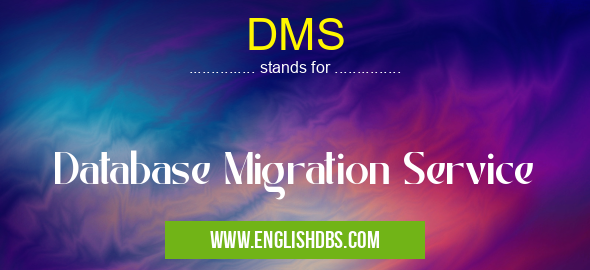What does DMS mean in DATABASES
DMS stands for Database Migration Service, a fully managed service offered by Amazon Web Services (AWS) for seamless and efficient database migrations. DMS enables the secure and reliable transfer of data from on-premises databases, other cloud platforms, or even within AWS environments.

DMS meaning in Databases in Computing
DMS mostly used in an acronym Databases in Category Computing that means Database Migration Service
Shorthand: DMS,
Full Form: Database Migration Service
For more information of "Database Migration Service", see the section below.
Introduction: Database Migration Service (DMS)
Key Features of DMS
- Support for Multiple Databases: DMS supports a wide range of popular database engines, including Oracle, MySQL, PostgreSQL, SQL Server, and Amazon Aurora.
- Automated Migration: The service automates the entire migration process, eliminating the need for manual data extraction, transformation, and loading (ETL).
- Flexible Scheduling: DMS allows for flexible migration schedules to minimize downtime and data loss during the transfer process.
- Data Validation: DMS continuously validates data during migration, ensuring data integrity and consistency.
- Progress Tracking: Real-time progress monitoring enables users to track the migration status and identify any potential issues.
- High Availability: DMS offers high availability and data durability, reducing the risk of data loss or corruption.
- Security: DMS uses industry-standard encryption protocols to protect data during migration.
Benefits of Using DMS
- Reduced Migration Costs: DMS eliminates the need for expensive third-party migration tools or manual processes, resulting in significant cost savings.
- Accelerated Migration Timelines: Automated migration significantly speeds up the process, allowing organizations to quickly migrate their databases to the desired platform.
- Improved Data Quality: DMS's data validation capabilities ensure the accuracy and consistency of migrated data.
- Simplified Management: The centralized management console provides a single interface for managing all migration tasks.
- Increased Agility: DMS enables organizations to respond quickly to changing business needs by facilitating database migrations.
Essential Questions and Answers on Database Migration Service in "COMPUTING»DB"
What is Database Migration Service (DMS)?
Database Migration Service (DMS) is a cloud-based service that enables seamless and secure migration of databases to and from various cloud and on-premises sources and targets. It provides a comprehensive solution for data migration, replication, and synchronization tasks, simplifying the process of moving data between disparate systems.
What are the benefits of using DMS?
DMS offers numerous benefits, including:
- Automated migration processes, reducing manual effort and minimizing downtime.
- Support for a wide range of data sources and targets, including relational, NoSQL, and cloud databases.
- Data validation and integrity checks to ensure data accuracy and consistency during migration.
- Monitoring and alerting capabilities to track progress and troubleshoot issues.
- Scalable and cost-effective solution for large-scale data migrations.
What types of database migrations can DMS handle?
DMS supports a variety of database migration scenarios, such as:
- Online migrations, allowing for continuous data replication without downtime.
- Offline migrations, involving data extraction and transfer during scheduled maintenance windows.
- Hybrid migrations, combining online and offline approaches for complex migrations.
- Data synchronization, maintaining consistency between multiple data sources.
How does DMS ensure data security during migration?
DMS prioritizes data security, implementing robust measures to protect sensitive information:
- Encrypted data transmission using industry-standard protocols.
- Access control mechanisms to restrict unauthorized access to data.
- Compliance with data privacy regulations and industry best practices.
What is the pricing model for DMS?
DMS follows a pay-as-you-go pricing model, charging based on the resources consumed during the migration process. Costs vary depending on factors such as data volume, migration type, and duration.
Final Words: DMS is an invaluable tool for organizations looking to migrate their databases securely, efficiently, and cost-effectively. Its automation capabilities, comprehensive support, and focus on data security make DMS the ideal choice for streamlining database migrations and ensuring business continuity.
DMS also stands for: |
|
| All stands for DMS |
